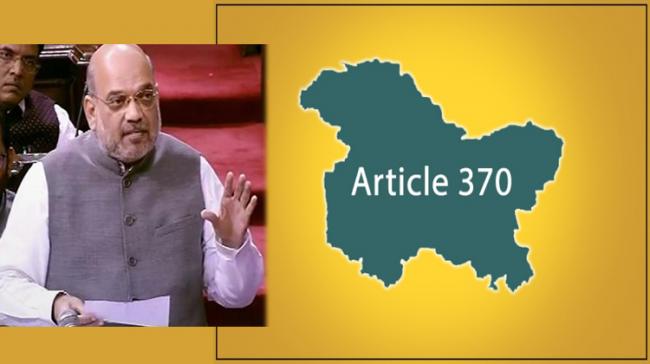Live Updates: Home Minister Proposes Revocation of Article 370

New Delhi: Home Minister Amit Shah created history by moving a resolution revoking Article 370 and 35 A of Constitution in the Rajya Sabha.
The Home Minister moved a resolution that all clauses of Article 370 will not be applicable to Jammu and Kashmir.
Making a historic announcement in the Rajya Sabha Shah said: "I am presenting the resolution to revoke Article 370 in Jammu and Kashmir except the first clause 370 (1)."
The government has decided to repeal Article 370 of the Constitution which grants special status to Jammu and Kashmir.
The government has also decided to bifurcate the state into two Union territories – Jammu and Kashmir, which will have a legislature, and Ladakh, which will be without a legislature.
Union Minister Amit Shah moves for birfurcation of Jammu and Kashmir.
Amit Shah introduces the Jammu and Kashmir Reorganisation bill.
Acrimonious scenes were seen in the House soon after the announcement of the Home Minister.
It is reported that the Government had issued a gazette signed by the President and the order comes into effect 'at once'.
Amit Shah says that all provisions of Article 370 will be considered null and void as soon as the President gives his assent to our proposal and the notification will be made available on all platforms.
Amit Shah says that two Lt Governors have been proposed, one for Jammu and Kashmir and one for Ladakh.
Rajya Sabha to discuss the provisions of the Bill, Rajya Sabha Speaker says everyone will be given an opportunity to discuss the provisions of the bill.
Article 370 scrapped by President of India
Notification on Article 370 signed by President of India.

Congress leader Ghulam Nabi Azad, first to object says that by revoking Article 370 that accords special status to Jammu and Kashmir, the BJP-led government has murdered the Constitution of India.
Union Home Minister Amit Shah makes it clear that it was wrong to say that Article 370 of the Constitution linked Jammu and Kashmir with India.
"Opposition leaders are saying that Article 370 brought Jammu and Kashmir to India. But the fact is that the Maharaja Hari Singh signed on October 27, 1947 (the Instrument of Accession) while Article 370 came into existence in 1949. "So this is wrong to say that Article 370 brought Jammu and Kashmir with India," the Minister told the Rajya Sabha in response to Congress leader and former Chief Minister Ghulam Nabi Azad who condemned the government decision to axe Article 370
Two members of the Peoples Democratic Party (PDP), Nazeer Ahmed Laway and Mir Mohammad Fayaz, were shunted out of the Rajya Sabha after they removed copies of the Constitution
Mehabooba Mufti reacts to the resolutions calling it the darkest day in Indian democracy.
Today marks the darkest day in Indian democracy. Decision of J&K leadership to reject 2 nation theory in 1947 & align with India has backfired. Unilateral decision of GOI to scrap Article 370 is illegal & unconstitutional which will make India an occupational force in J&K. — Mehbooba Mufti (@MehboobaMufti) August 5, 2019
Today marks the darkest day in Indian democracy. Decision of J&K leadership to reject 2 nation theory in 1947 & align with India has backfired. Unilateral decision of GOI to scrap Article 370 is illegal & unconstitutional which will make India an occupational force in J&K. — Mehbooba Mufti (@MehboobaMufti) August 5, 2019
Prime Minister to address Nation on August 7.
Glorious day,' writes Ram Madhav | BJP leader
What a glorious day. Finally d martyrdom of thousands starting with Dr Shyam Prasad Mukharjee for compete integration of J&K into Indian Union is being honoured and d seven decade old demand of d entire nation being realised in front of our eyes; in our life time.Ever imagined?? — Ram Madhav (@rammadhavbjp) August 5, 2019
Jamyang Tsering Namgyal, BJP MP from Ladakh welcomes the Bill on behalf of people of Ladakh. People there wanted the region to be a Union Territory. People in Ladakh wanted that the region be freed from the dominance & discrimination of Kashmir, that is happening today.
What does Article 370 say: Article 370 exempts J&K from the Indian Constitution (except Article 1 and Article 370 itself) and permits the state to draft its own Constitution. It restricts Parliament’s legislative powers in respect of Jammu and Kashmir.
Article 370 bestows Jammu and Kashmir its own constitution and decision-making rights for all matters barring defence, communications and foreign affairs.
- The removal of this part of the constitution ends special status for Kashmir, which was key to its accession to India in 1947.
What is Article 35A: Article 35A which is part of Article 370, was introduced through a Presidential Order in 1954. Article 35A empowers the J&K legislature to define the state’s permanent residents and their special rights and privileges.
Stay Tuned for more updates.




